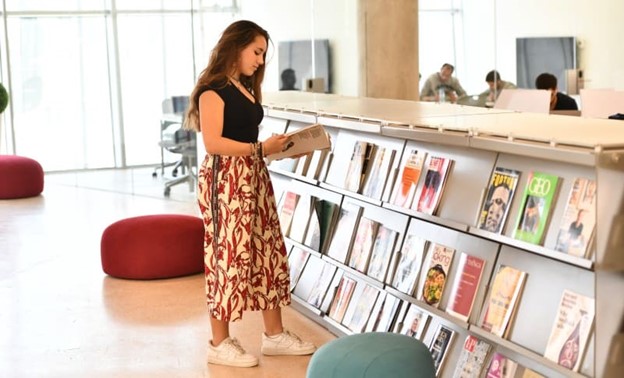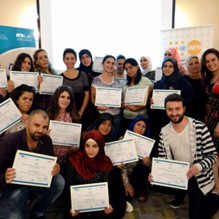Free Access to Educational Resources
LAU offers a variety of educational resources accessible to the public for free. The university’s libraries provide free access to a wealth of resources, including books, journals, and online databases. Additionally, LAU frequently hosts public lectures, workshops, and conferences, featuring renowned experts and providing valuable insights into various fields of study. These events are open to the public and offer opportunities for lifelong learning and intellectual enrichment.
LAU Libraries Enter New Partnership that Gives Access to School Students
Students from the Monsif International School can now access LAU Libraries through a formal subscription plan signed with the university, which includes training and information sessions on how to use the library facilities. This step underscores the university’s commitment to Quality Education and Sustainable Cities and Communities, two of the United Nations Sustainable Development Goals (SDGs); SDGs 4 and 11, respectively.
Lebanese American University Repository (LAUR)
LAU provides free access to educational resources for those not studying at the university through the LAUR which is an Open-Access digital archive for the scholarly output of the Lebanese American University community. Its mission is to preserve, showcase, and provide open access and international exposure to scholarship and research of LAU faculty, staff and graduate students. It also serves as an archive of historical and other materials that support the University’s academic mission. LAUR objectives are to collect selected materials in a centralized, searchable, and highly visible location in order to maximize their access and visibility.
Depositing materials in LAUR is voluntary for faculty which are encouraged to make their work openly accessible to LAU community and the rest of the world while graduate students are required to deposit one print and one digital copy of their final master’s thesis .
The repository currently includes all graduate students theses, and will include LAU’s research reports, journal articles, book chapters, digital images, and any data which can be easily harvested by search engines such as Google. All theses published after 2003 are Open Access, while those published before 2003 are accessible via student authentication.
Youth Leadership Simulation Programs
As a middle-school or high-school student, you will find in these programs a launchpad to build leadership, research, debate, public speaking, problem-solving, and writing skills — all essential tools to help them succeed academically and professionally. Through these programs, and since 2005, the university has helped empower a generation of youth leaders.
The Impact Since 2004
300 Participating high schools
15,765 LAU student leaders
62,905 High school student leaders
By Students, for Students
All five LAU Simulation Models are entirely student-led and organized. The training content is prepared, delivered and managed by LAU students – themselves a large, diverse group of motivated youth who are majoring in different disciplines but united in their vision and mission to promote youth leadership. They meticulously manage school relations, prepare the training content that they deliver, provide technical support, organize special events within the programs, and ensure that the work runs seamlessly.
Many LAU student leaders are selected to participate in the annual Global Classrooms International Model United Nations Program in New York City, which brings together middle school and high school students from all over the world to role-play and train as ambassadors.
Through the Simulation Programs, You…
Step into the shoes of ambassadors
You learn how international diplomacy works.
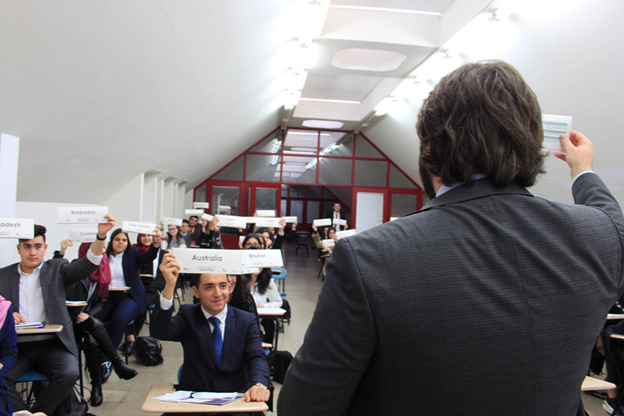
Get hands-on training
For a few months, you come to LAU to get training in research and interpretation, rules of procedure, writing position papers, public speaking, role playing, conflict resolution, negotiations, caucusing, and more.
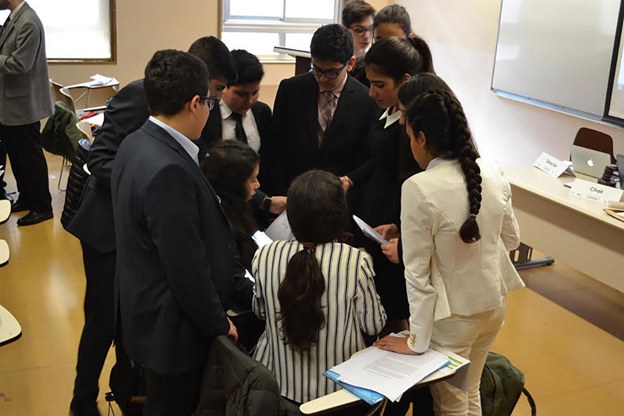
Learn technical skills
You’ll have fun and learn about procedures, institutions, functions, human rights, and inter-cultural dialogues.
Turn theory into practice
It ends with a big conference where you take the role of an ambassador from a country and get involved in a current issue or situation.
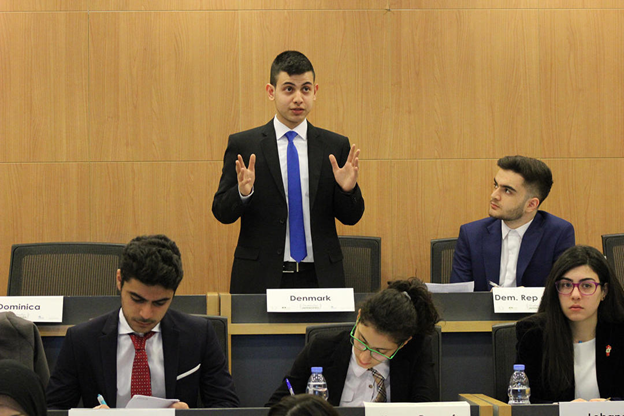
Two-minute tour of LAU simulation programs
A preview of the middle and high schoolers’ experiences across the LAU Youth Leadership Simulation Programs.
Why Take Part in LAU’s Simulation Programs?
You will immerse yourself in the culture of the United Nations, Arab League, European Union, African Union and Good Governance. You will come out of the programs stronger at:
Art of Public Speaking
Dynamics of Debate
Tactics of Role-Play
Process of Conflict Resolution
Essence of Research
Your doorway to a scholarship
In line with its vision to seek and reward talented students, LAU allocates 50 and 25 percent scholarships every year to middle and high schoolers who show exceptional skills in the simulation programs.
Our Flagship Programs
Ever year thousands of middle and high schoolers flock to both LAU campuses to take part in the simulation programs. Find out more and choose the program that is right for you:
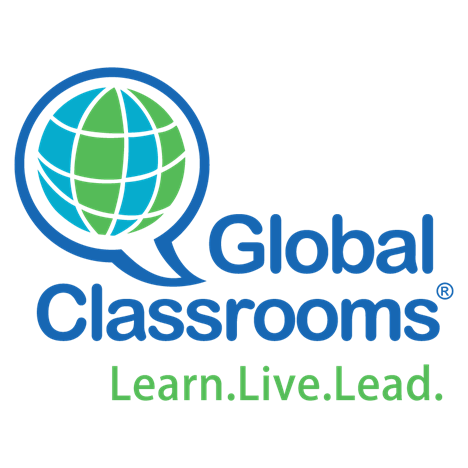
Global Classroom International Model United Nations (GCI MUN)

Global Classroom LAU Model United Nations (GC LAU MUN)
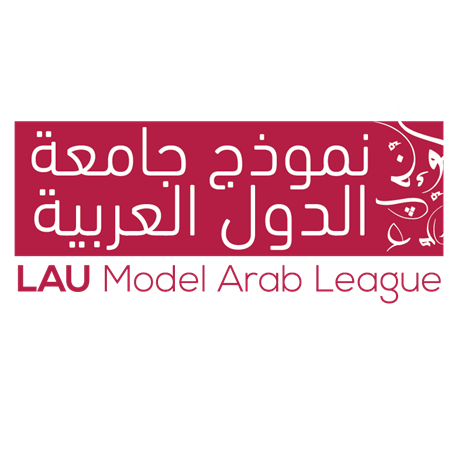
LAU Model Arab League (LAU MAL)

LAU Model European Union (LAU MEU)
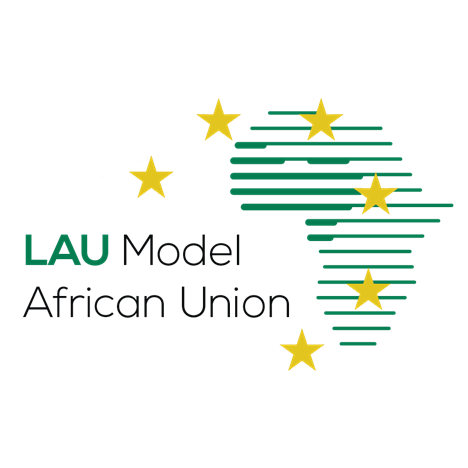
LAU Model African Union (LAU MAU)- Not offered this year
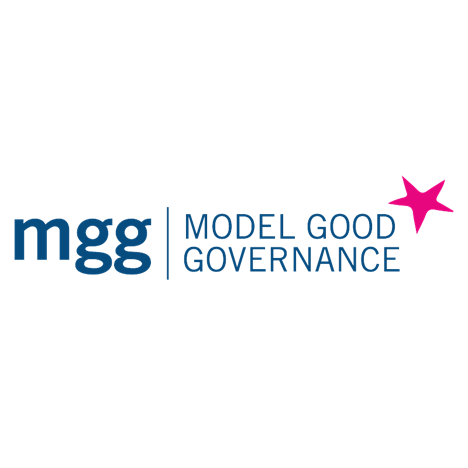
This program empowers our LAU students by entrusting them to manage, assess, and modify huge educational and leadership events for maximum impact. Our students become administrators, teachers, IT experts, accountants, mentors, public speakers … In brief, they become confident, inspirational leaders. The skills they practice will be with them their entire lives, so it’s no surprise that they land top jobs, get into leading universities and are the recipients of global awards.
Dr. Elise Salem, Vice President for Student Development and Enrollment Management
Contact Us
Academy of Continuing Education
Mission & Vision
The Lebanese American University Academy of Continuing Education (LAU ACE) marshals LAU by encompassing all schools in reaching out to communities for the purpose of adult education, professional enhancement, applied research and impact creativity. Through LAU ACE, LAU as an institution of higher learning is committed to community engagement on the broadest scale, in the interest of sustainable knowledge driven by socio-economic developments.
Vision
LAU ACE aims to improve the quality of professional and personal lives by promoting knowledge, skills, and educational opportunities through the delivery of impactful lifelong learning for individuals, companies, and communities.
Mission
Through building and constantly nourishing links with multiple communities of practice, LAU ACE’s mission complements LAU’s by providing state-of-the-art academic and technical training for lifelong learners in the form of courses, workshops, diplomas, and professional certifications, leading to the betterment of employment opportunities or improvement of job performance, reflected in both personal and professional growth, across Lebanon and the region.
Core Values
Educational Excellence: in tandem with LAU’s vision, we provide a superior educational experience to our learners in terms of faculty selectivity, content quality, and service excellence.
Flexibility and Adaptability: we regularly update our offerings to reflect socio-economical changes in the marketplace. Additionally, we provide flexible solutions, schedules, and locations to cater to our learners’ needs.
Learner Centricity: we put our students first; we provide them with all the support needed, we listen to them and take their feedback seriously with the aim of enhancing the overall learning experience.
Innovation: we encourage innovation and creativity. We anticipate changing demands that might reflect on our courses in order to provide the most innovative learning solutions.
Social Responsibility: we collaborate with different NGO’s and organizations on many levels as part of our contribution to corporate social responsibility initiatives.
Summer and Boot Camps
Your opportunity to secure a scholarship of up to 30% toward your chosen major at LAU!
Welcome to the School of Arts and Sciences Summer and Boot Camps 2024!
Our School will be holding three boot camps and five summer camps in July 2024.
- All Summer Camps will be open for registration to high school students who are still in grades 10 and 11. At the end of each summer camp, students will be assessed with regard to the content covered in the camps, and scholarships will be offered to the top five candidates in each camp, ranging between 10% to 30%.
- Running a period of two weeks, the XR Boot Camp will be open for registration to high school students, university students as well as more senior members of the community. At the end of the camp, participants will receive a certificate of completion. Scholarships will be offered to the winning candidates in the camp, ranging between 10% to 30%.
- Similar to the summer camps, the Pre-medical Boot Camp will be open for registration to high school students who are still in grades 10 and 11. The camp will run for a period of six days.
- The AI Boot Camp will also be open for registration to high school students who are still in grades 10 and 11, running for a period of two weeks. At the end of the camp, scholarships ranging between 10% and 30% will be offered to the winners.
Once registered, you will receive a notification voucher via email relaying that you need to proceed to settle your registration fees at any OMT or BOB Finance branch. You will have up to seven days from the registration confirmation to settle your payment otherwise your registration will be cancelled.
Note that spots are limited for each camp.
International Dance Day Festival in Lebanon
“We are a group of people (Dancers, Dance enthusiasts, Supports of the Arts, Educators and so on) who are concerned with Dance and its situation in Lebanon and its exposure to dance abroad. Our goal is to see the Lebanese dance field grow and expand its roots nationally and internationally as well.”
Founder and Director: Dr. Nadra Assaf
Previous Events
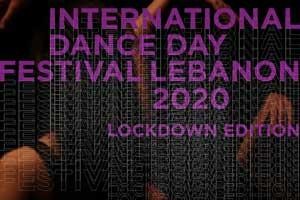
International Dance Day Festival in Lebanon 2020: Lockdown edition

International Dance Day Festival in Lebanon 2019
\
International Dance Day Festival in Lebanon 2018
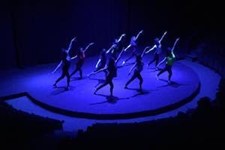
International Dance Day Festival in Lebanon 2017
Gender in Development and Humanitarian Assistance (GDHA) Certificate
Overview
In collaboration with The Arab Institute for Women (AIW) at the Lebanese American University (LAU), the Gender in Development and Humanitarian Assistance (GDHA) Certificate is a continuing education program designed for students, practitioners, and policymakers. The program addresses gender issues in development and humanitarian settings. GDHA innovatively incorporates academic knowledge with high-level expertise to create a new standard in gender education for development and humanitarian professionals. The standards are in-line with internationally-recognized practices. Moreover, the program builds local capacity to address local issues, building a cadre of motivated professionals in the Arab region.
Content
The program involves an active learning approach with practical workshops. It also emphasizes reflective and collaborative learning. Participants may choose to take individual courses or to complete the full set. Upon completion of all ten courses, participants receive a certificate.
Objectives
- Address the full range of gender issues in development and humanitarian contexts
- Build Arab capacity to address Arab development and humanitarian challenges
- Provide technical, marketable skills in gender programming to address gender inequalities
- Establish foundational knowledge in global and regional best practices on gender equality and women’s rights
Contact us
Email: joanna.fayad@lau.edu.lb
Phone: +961 1 786 456, ext. 1106
Free Webinars and Events Archive
2023
7Nov
An Encounter With Raoul Verney, The Man, The Architect, The Educator Conferences & Symposia LAU Beirut Campus, Gezairi Building, Chafica Balaa Lecture Hall 403
27Oct
Managing Stress in Uncertain Times Webinars Webex
24Oct
Talk to the Experts: Workshop to Help You Cope Workshops & Seminars LAU Byblos campus, Frem 505
23Oct
Talk to the Experts: Workshop to Help You Cope Workshops & Seminars LAU Beirut campus, WKSC 201
19–20Oct
Teaching Graphic Design History in/of the Arab World: Narratives and Practices (Postponed)Conferences & Symposia Online
23Sep
Open Days, Open Doors Fairs & Expos LAU Byblos Campus
16Sep
Open Days, Open Doors Fairs & Expos LAU Beirut Campus
12Jun
Graduate Fashion Show: Real Time Exhibits Gezairi Building Rooftop, Beirut Campus
2May
Institute of Art in the Arab World Inaugural Event Talks Gezairy Building 403 Lecture Hall
9Mar
Celebrating Niemeyer’s Tripoli World Fair Fairs & Expos Beirut Campus, AKSOB 0904
22Feb
Arabic Comics and Conflicts: Ideological Indoctrination vs Individual Need for Change Talks LAU Beirut Campus, Gezairi Building 403
2022
18–26Nov
ROOTING: A Solo Exhibition by Alumna Rana Raouda Exhibits LAU Beirut Campus - Safadi Fine Arts Building - Sheikh Zayed Exhibition Hall
16Nov
Poetics of Structure Webinars Online via Webex
22Oct
Open Days…Open Doors Fairs & Expos LAU Beirut Campus
10–25Oct
X-Tended Reality Competition - Dare to C Competitions Online
24–27Jun
BioFashion Factory ExhibitionExhibits600A, Gezairi Building, Beirut Campus
23Jun
Graduate Fashion Show: Ignite Ceremonies Level 7 - Ground Floor, Gezairi Building, Beirut Campus
21–25Jun
Graphic Design ExhibitionExhibits605, Gezairi Building, Beirut Campus
23–25May
Zero Waste Fashion: An Eco-Design Marathon Workshops & Seminars Beirut Campus
24Mar
DESIGN TO CARE? Webinars Online
17Mar
A History of Arab Graphic Design: Q&A with Haytham Nawar Webinars Online
11Mar
Hidden Portraits & the Pertinence of Individuality Webinars Online
23Feb
On How Things Meet: A Career Introspection Webinars Online
2Feb
Architecture in the Age of Artificial Intelligence: An Introduction to AI for Architects Webinars Online
27Jan
1Jan
Interpretations, Reinterpretations Webinars Online
2021
24Nov
Carrying Images - Thoughts on Graphic Design Webinars Online
11–13Nov
International Workshop Beirut - SynErgy in the City - On DIY Mobility and Energy Infrastructure Conferences & Symposia IUA ALBA, Sin el Fil
3Nov
Infrastructural Webinars Online
27Oct
Counter Mapping & Identity Representation Webinars Online Via Webex
20Oct
How to Look at Architecture? Webinars Online
13Oct
Triggering the Empirical Space Webinars Online Via Webex
29Sep
Neoliberalism, Globalization, and the Ecological Crisis Conferences & Symposia Online Via Webex
22Sep
SUrF Webinars Online Via Webex
16Sep
Dialogues in Time: Light, Time and Architecture in Art Webinars Online Via Webex
9Sep
Art and Architectural Education in Times of Pandemic Webinars Online Via Webex
30Jun
“Rise” Exhibits Online
6May
A Different Kind of Climate Change Webinars Online
29Apr
Digital Fashion Webinars Online Via Webex
23Apr
Architectural Paths Webinars Online
22Apr
Photography as Storytelling Webinars Online
21Apr
Beyond Campus Gates: Redefining the Role of Universities Webinars Online
15Apr
Real Virtuality and Immersive Storytelling Webinars Online
10Apr
Bits to Atoms Webinars Online
10Apr
The Wonderful World of Rana Salam Webinars Online
9Apr
RE: WORK Webinars Online
8Apr
Relevance v/s Difference Webinars Online
1Apr
Flirting with Middle Eastern Modernity Webinars Online
26Mar
OMA / AMO in the Middle East Webinars Online
19Mar
Critical Imaginations Webinars Online
19Mar
Fallen Fashion Webinars Online
26Feb
Beirut-Rotterdam: Complex Urban Recoveries Webinars Online via WebEx
18Feb
Anthony Caro: The Onward of Art Webinars Online
12Feb
Panser la Ville Naturelle Webinars Online
5Feb
Giancarlo Floridi Webinars Online
29Jan
Second Hand Webinars Online
SARD Events:
The School of Architecture and Design at LAU hosts several events at the university that are open to the general public with the majority of such events being lectures. Throughout the academic year 2021–2022 such lectures were held as open-to-the-public online webinars as follows:
1. “Art and Architectural Education in Times of Pandemic” Online Webinar — Sept. 9, 2021
2. “Dialogues in Time: Light, Time and Architecture in Art” Online Webinar — Sept. 16, 2021
3. “SurF” Online Webinar — Sept. 22, 2021
4. “Triggering the Empirical Space” Online Webinar — Oct. 13, 2021
5. “How to Look at Architecture?” Online Webinar — Oct. 20 2021
6. “Counter Mapping & Identity Representation” Online Webinar — Oct. 27, 2021
7. “Infrastructural” Online Webinar — Nov. 3, 2021
8. “Carrying Images: Thoughts on Graphic Design” Online Webinar — Nov. 24, 2021
9. “Interpretations, Reinterpretations” Online Webinar — Jan. 1, 2022
10. “Architecture in the Age of Artificial Intelligence: An Introduction to AI for ArchitectsWebinarsOnline Feb. 2, 2022
11. “On How Things Meet: A Career Introspection” Online Webinar — Feb. 23, 2022
12. “Hidden Portraits & the Pertinence of Individuality” Online Webinar — Mar. 11, 2022
13. “A History of Arab Graphic Design: Q&A with Haytham Nawar” Online Webinar — Mar. 17, 2022
14. “Design to Care?” Online Webinar — Mar. 24, 2022
The LAU Simulation models are programs that serve as a launchpad to build leadership, research, debate, public speaking, problem-solving, and writing skills — all essential tools to help middle school and high school students coming from more than 200 schools from all over Lebanon, to succeed academically and professionally. Through these programs, and since 2005, the university has helped empower a generation of youth leaders.
The physics program and its associated clubs, the LAU Physics Club and LAU Astronomy Club, has organized several events, including public lectures, stargazing, movie screenings, and interactive discussions, all accessible to the public.
| DA&D Events-2022 | ||||||
| Name | Type | Artist | Date | |||
| Hidden Portraits & The Pertinence of Individuality: Volker Hermes | Webex Fashion Lecture | Jalal Moghraby | 11/02/2022 | |||
| A History of Graphic Design | Webex Lecture | Haytham Nawar | 17/03/2022 | |||
| Design to Care? | Webex Fashion Lecture | Jalal Moghraby | 24/03/2022 | |||
| A History of Arab Graphic Design -Q& A | Webinar Graphic Design | Haytham Nawar | 17/3/2022 | |||
| Design to Care? | Webinar Fashion Design | Elisa van Joolen | 24/3/2022 | |||
| The Palestine Poster: A Living Heritage Force | Webex Lecture | Dan Walsh | 07/04/2022 | |||
| 35 + 35… A Retrospective of a Lifetime | Photography Exhibition | Bassam Lahoud | 10/04/2022 | |||
| Geographies | Webex Lecture | David Maes | 14/04/2022 | |||
| 22 Bit | Graphic Design Senior Students’ Exhibition | GD Students | 21/6/2022 | |||
| The Palestine Poster: A Living Heritage Force | Webinar Graphic Design | Dan Walsh | 04/07/2022 | |||
| Digital Art and a Crisis of Scarcity | Lecture | Ralph Hage | 06/10/2022 | |||
| State of Things | Faculty Exhibition | 13/10/2022 | ||||
| Hidden Portraits & The Pertinence of Individuality | Webinar Fashion Design | Volker Hermes | 03/11/2022 | |||
| DA&D Events-2023 | ||||||
| Name | Type | Artist | Date | |||
| Diversity Equity Inclusion | Students Poster Competition | DA&D Students | 10/01/2023 | |||
| Divergence & Convergence in a Double Diamond World | Lecture | Nivine El Kuzbari | 16/02/2023 | |||
| ARABIC COMICS AND CONFLICTS: IDEOLOGICAL INDOCTRINATION VS INDIVIDUAL NEED FOR CHANGE | Lecture | George Khoury-Jad | 22/02/2023 | |||
| Highschool GD Workshop | Workshop | Dahlia Khodur/Araz Kelian | 04/03/2023 | |||
| The Philosophy of Art & Mysticism in Arabic Calligraphy | Workshop | Nassib Makarem | 17/03/2023 | |||
| Ornamenting the Everyday | Lecture | Eddie Abd | 30/03/2023 | |||
| The Fickleness of the Film Strip | Lecture | Ziad Antar | 06/04/2023 | |||
| Wildlife photography and Conservation | Lecture | Michel Zoghzoghi | 13/04/2023 | |||
| Interface 5 | FA Graduates Exhibition | FA Graduates | 02/05/2023 | |||
| Interface 6 | FA Senior Exhibition | FA Seniors | 15/05/2023 | |||
| The Journey to One’s Self | Lecture | Hayla Saab | 26/05/2023 | |||
| Maintaining the Chaos in One Self | Lecture | Bernard Haddad | 26/05/2023 | |||
| Captured Perspectives | Exhibition | Photography Students | 20/09/2023 | |||
| Brazilian Embassy-Tripoli Fair | Lecture/Presentation | Brazilian Embassy | 09/11/2023 | |||
| The Big Picture | Lecture | Nathalie Fallaha | 14/11/2023 | |||
| MAPPING, NARRATING, REPRESENTING AS ACTION | Lecture | Nadine Bekdache | 21/11/2023 | |||
| Risograph Workshop | Workshop | 24/11/2023 | ||||
| GRDE 2023 | Exhibition | GD Senior Students | 28/11/2023 | |||
| Incorporating Diversity & Culture into Graphic Design | Lecture | Diala Nammour | 05/12/2023 | |||
Faculty Personal and Professional Development
The School and University are heavily vested in supporting the personal and professional development of faculty. These can be through programs that are school-sponsored, LAU’s Office of Graduate Studies and Research and Center for Innovative Learning, partnerships such as with the National Council for Scientific Research, and with funds allocated by the school research committee for faculty research, training, attendance of professional meetings, and reimbursement of publication fees. Application to these grants follow the guidelines of the School Research Committee.
Professional Development Committee
The Professional Development Committee is composed of representatives of School administrators, full-time and adjunct Faculty and staff. Its main duties are to identify the professional development needs of faculty and preceptors, and coordinate the delivery of continuing education and professional advancement activities.
School-Sponsored Professional Development Seminars and Workshops
| Topic | Date |
| Assessment Best Practices-Updates from the UAE Workshop | 13/11/2024 |
| Best Practices in Online Education | 30/10/2024 |
| Virtual Training on FreeStyle Libre Continuous Glucose Monitoring (CGM) Kit | 29/10/2024 |
| Bioequivalence and Generic Drug Products: Scientific and Regulatory Considerations | 22/10/2024 |
| Maximizing Accesspharmacy for Pharmacy Education and Practice | 08/10/2024 |
| A Glimpse of Health Economics: The Science of Choice and Incentives in Health and Healthcare | 12/09/2024 |
| AI in Pharmacy Education - Updates from the AACP AI Institute | 28/05/2024 |
| Navigating the Future of Pharmacy: An Introduction to Health Informatics and Digital Health | 23/04/2024 |
| The Role of Nonclinical Testing in Drug Development | 16/04/2024 |
| Introduction to Digital Health: Evolution, Impact, and Challenges | 08/04/2024 |
| Building Resilience and Developing a Growth Mindset | 14/03/2024 |
| Clinical Paths in the Modern Treatment of Multiple Sclerosis | 13/02/2024 |
| Supporting DEIA at LAU’s School of Pharmacy | 07/12/2023 |
| Knowing Self & Others (Johari Window Model) & Receiving Constructive Feedback | 30/11/2023 |
| Self-reflection in Healthcare Settings: Aims & Practices | 20/11/2023 |
| DEIB: Addressing Microaggressions in Clinical Education & Practice | 09/11/2023 |
| Digital Health in Clinical Settings | 31/10/2023 |
| Cancer Immunotherapy Research | 26/09/2023 |
| Real world evidence as a tool to inform decisions throughout the lifecycle of medicines: A perspective from the pharma industry | 17/05/2023 |
| Lebanese Army Healthcare System and Pharmacy Services | 28/04/2023 |
| Dealing with Imposter Syndrome | 04/04/2023 |
| Drug Development in the US | 31/03/2023 |
| Cochrane Reviews | 28/02/2023 |
| The Power of Low-Ego, High Drive Leadership: Humbitious | 16/02/2023 |
| Tools for Preceptors to Turn Challenges into Opportunities | 12/10/2022 |
| Cultural Competency: A must to Optimize Care in a Diverse Healthcare System and Patient Population | 11/04/2022 |
| Clinical Updates in Heart Failure | 15/03/2022 |
| Clinical Updates in Diabetes | 07/04/2021 |
| Role of Pharmacists in Crisis / COVID-19 | 14/01/2021 |
| Antimicrobial Resistance and Stewardship in the Era of a Pandemic | 03/12/2020 |
| IPE education: best practices for curriculum integration, assessment & accreditation | 16/11/2020 |
| Online course delivery | 08/09/2020 |
| PPCP integration in pharmacy curricula | 26/02/2020 |
| Systematic review | 27/01/2020 |
| Flipped classroom | 11/08/2019 |
| Crucial conversation: giving feedback | 03/05/2019 |
| Power of learning (OCEs-led workshop) | 25/04/2019 |
| Antibiotics refresher* | 29/01/2019 |
| Making IT healthy: medication safety and rise in technology (ACPE CE credits)† | 07/11/2018 |
| The power of innovation | 21/05/2018 |
| Updates in infectious disease-clinical pearls* | 03/05/2018 |
| Evidence-based research: how to design search strategies for systematic reviews | 10/04/2018 |
| Lean Pharmacy management† | 05/12/2017 |
| PCSK9 Inhibitors: where do we stand?† | 05/12/2017 |
| Tips for success in academic publishing | 27/11/2017 |
| Introduction to OSCEs | 18/10/2017 |
| Code of ethics for drug promotion* | 11/04/2017 |
| Clinical (pharmacy) research initiatives* | 06/04/2017 |
| Research design | 13/02/2017 |
| Management of non-small cell lung cancer* | 26/05/2016 |
| Teaching and learning in the 21st century | 13/05/2016 |
| Sedation, analgesia and delirium in the ICU: what’s new?* | 05/05/2016 |
| Insights in simulation-based education | 25/04/2016 |
| Publishing educational papers | 08/04/2016 |
| Quality assessment of publications | 07/12/2015 |
| Pharmacoeconomics† | 03/11/2015 |
| Treatment and prevention of thrombosis* | 29/10/2015 |
| Biostatistics application (series of 7 sessions) | 03/09; 16; 23; 04/20; 05/04; 13; 27/2015 |
| Highlights in antithrombotic therapy* | 26/03/2015 |
| Management of febrile neutropenia* | 29/01/2015 |
| Ebola virus disease† | 29/01/2015 |
*Held at LAU Medical Center-Rizk Hospital (LAUMC-RH).
†Held at the Annual Preceptors Appreciation Event.
Professional Development Resources
Faculty Development in Teaching
Faculty Development in Clinical Skills
Faculty Development in Soft-Skills / Leadership
Faculty Development in Research
Faculty Mentoring
The School of Pharmacy values and supports the continuing professional development and career advancement of its Faculty. In order to achieve these goals, annual funds are allocated to support individual full-time faculty members in further developing their skills and abilities in the areas of teaching, research, service and leadership. Furthermore, faculty members especially junior faculty who have identified needs for professional development are assigned a senior faculty mentor who will provide formative mentoring and guidance on career development in accordance to a formal Individual Faculty Mentoring and Development Plan document.
The Arab Institute for Women
The Food for Thought series at LAU’s Arab Institute for Women (AIW) is a monthly event designed to spark critical thinking and dialogue on various topics related to gender, women’s rights, and social justice. These sessions typically feature guest speakers, panel discussions, and open forums, providing a platform for diverse perspectives and engaging conversations.
The topics covered in the Food for Thought series are wide-ranging and often address pressing social issues. Some past topics have included:
Webinar: “Gender and the Environment” (24/02/2023)
Webinar: “Call to Action: Women’s Leadership in Lebanon’s Crisis and Recovery” (07/12/2022)
Webinar: Personal Status Laws: Amending the Codes (05/07/2022)
Webinar: Stand Up Against Street Harassment (05/07/2022)
Why Gender Justice Matters (09/11/2021)
Sexuality Matters (09/06/2021)
Work That Breaks Gender Barriers (29/04/2021)
Gender Discrimination: Legal, Political and Economic Implications (05/01/2021)
The Pandemic, The Blast and Their Effects on Gender Rights (02/12/2020)
Women in Decision Making (01/10/2019)
Taking Up Space! (01/05/2019)
Women’s Empowerment Challenges (14/02/2019)
Safety is Bold, Guard Yourself! (04/02/2019)
Fighting Stigma and Discrimination (30/11/2018)
From Spring to Autumn (01/10/2018)
The Arab Institute for Women (AIW) at the Lebanese American University (LAU) is dedicated to advancing gender equality and empowering women in the Arab world. To achieve this mission, AIW focuses on several key thematic areas:
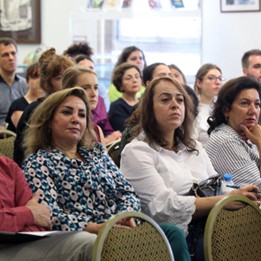
Advocating for Equality in Legislation
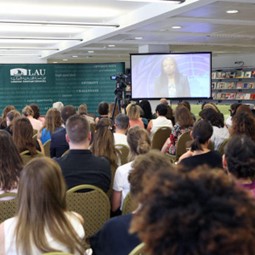
Engaging Women in Peace & Security

Preventing Gender-Based Violence
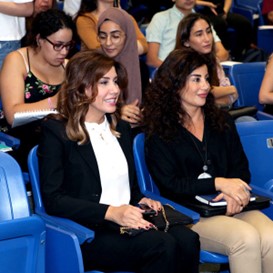
Promoting Women’s Political Participation
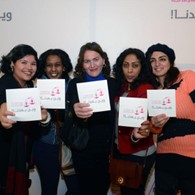
As part of The AiW’s continuing dedication to promoting rigorous intellectual and academic work on the issues of gender equality and women’s rights, the Institute organizes its annual Dr. Suad Joseph Distinguished Lecture Series. The aim of the series is twofold; first, to bring speakers who highlight important topics or themes in the field of gender and women’s studies globally, with the aim to contextualize this to the Arab region and second, to provide graduate students from across the university and specifically, from the MA in Interdisciplinary Gender Studies the opportunity to liaise directly with such high-level academics and researchers. https://aiw.lau.edu.lb/news-events/suad-joseph-lectures/
* The AiW organizes an informal speaking series entitled Food 4 Thought (F4T), a discussion space focused on students but open to the entire LAU community to address current topics related to gender. These discussions are facilitated by different speakers for each session and have included grassroots activists, visiting scholars, media professionals, and others. https://aiw.lau.edu.lb/news-events/food4thought/
2023 events included:
- Panel discussion “Sextarianism” book https://aiw.lau.edu.lb/news-events/activities/panel-discussion-sextarianism.php
- Regional workshop: “Women’s Political Participation in the Arab Region” https://aiw.lau.edu.lb/news-events/activities/regional-workshop-womens-politic.php
- Panel discussion: “Gender Equality and Technology: Women’s Inclusion in the Digital World” https://aiw.lau.edu.lb/news-events/activities/international-womens-day-gender-.php
- Panel discussion: “Innovation, Change, and Education for Women in the Digital Age” https://aiw.lau.edu.lb/news-events/activities/athena40-5th-global-conversation.php
- Panel discussion: “Lebanon: Understanding Anti-Feminist Backlash” https://aiw.lau.edu.lb/news-events/activities/paper-launching-lebanon-understa.php
- Launching event and panel discussion: “Routledge Handbook on Women in the Middle East” https://aiw.lau.edu.lb/news-events/activities/book-launching-routledge-handboo.php
- Launching event and panel discussion: “Gendering Civil War: Francophone Women’s Writing in Lebanon” https://aiw.lau.edu.lb/news-events/activities/book-launching-gendering-civil-w.php
- Launching event and panel discussion: “Frontiers of Gender Equality: Transnational Legal Perspectives” https://aiw.lau.edu.lb/news-events/activities/panel-discussion-frontiers-of-ge.php
- Panel discussion: “International Humanitarian Law and the Gendered Implications of Conflict”
LAU Simulation Models
LAU Simulation Models are entirely student-led and organized. The training content is prepared, delivered and managed by LAU students – themselves a large, diverse group of motivated youth who are majoring in different disciplines but united in their vision and mission to promote youth leadership. They meticulously manage school relations, prepare the training content that they deliver, provide technical support, organize special events within the programs, and ensure that the work runs seamlessly. These programs target more than 3,000 school students from all over Lebanon on a yearly basis.
The physics program organizes summer camps for high school students (Grade 11), offering them a unique opportunity to explore captivating subjects such as electromagnetism, Einstein’s theory of relativity, and quantum physics. Moreover, the camp delves into a wide range of energy resources and technologies, encompassing fossil fuels, nuclear power, hydropower, geothermal energy, wind power, and solar energy. The camp is designed to provide an immersive learning experience through interactive lectures, experiments, and documentaries. In addition, students conduct a residential energy audit, uncovering best practices for reducing their carbon footprint
Online Learning “Media and Palestine”
From LAU’s first course for Open, Online Learning “Media and Palestine”.
We are glad to announce that the “Media and Palestine” fully online, 30 hours, free of cost Course, currently has 81 participants from #Lebanon, #Jordan, #Morrocco, #Palestine, #Syria and other #countries, registered for the Fall 2023 semester.
To all aspiring journalists and Palestinian studies enthusiasts, the course will be available again in the Fall 2024 semester!
 |
 |
The Readers’ Club Engages Youth in Local Communities
In pursuit of its mission to grow its national outreach and empower readers, the LAU Libraries Readers’ Club partnered with the Institute of Management and Services to host a roundtable book discussion for young girls in Maad village, Byblos. In line with the LAU Libraries’ strategic goal to promote social responsibility, the club anticipates sparking further intellectual dialogues and building connections within rural communities around the country.

LAU Libraries Circulation

Who may use the library
The LAU Libraries exist primarily to meet the needs of the students, faculty and staff of the Lebanese American University. We also regularly serve alumni and special guests of the university. Other visitors are welcome to use the Libraries’ on-site facilities and resources for research and educational purposes, generally for a limited period of time and depending on individual needs. Follow this LINK for more details.
Loan period
Books, CDs, DVDs, and videos can be checked out of the library according to a set of rules and regulations. Laptops and iPads may be borrowed by students only, to be used inside the library premises for up to three (3) hours, renewable twice. Calculators may be borrowed by students only and for up to four (4) hours.
|
Borrower category |
Number of items allowed |
Length of loan |
Renewal |
|
Faculty, full-time |
50 |
90 days |
3 times |
|
Faculty, part-time |
25 |
90 days |
3 times |
|
Executive officers |
50 |
90 days |
3 times |
|
Staff, full-time |
15 |
4 Weeks |
3 times |
|
Staff, part-time |
5 |
4 Weeks |
3 times |
|
Graduate students |
20 |
6 Weeks |
3 times |
|
Undergraduate students |
10 |
2 Weeks |
3 times |
|
Alumni ($50 refundable deposit) |
2 |
4 Weeks |
3 times |
|
LAU retirees |
5 |
4 Weeks |
3 times |
|
Institutions ($500 annual subscription + $300 refundable deposit) |
30 |
4 Weeks |
3 times |
|
Unaffiliated users ($150 annual subscription) |
3 |
4 Weeks |
3 times |
Renewals, returns and reservations
Books and audiovisual materials may be renewed numerous times unless they are reserved by another user. Equipment such as laptops and iPads may be renewed twice only. Renewals may be done either online by signing in to your account at the Library Online Catalog, by emailing the Circulation unit, by calling the Circulation desk @ Ext. 1213, Ext. 2280, or Ext. 2977, or through WhatsApp.
Eligible borrowers may reserve books and audiovisual materials that are already on-loan. Reservation may be done either through the Library Online Catalog or in person at the Circulation desk.
When a reserved book or audiovisual item is returned to the library, the requester will receive an email informing him/her of its availability.
Charges for overdue, lost and damaged library items
Overdue fines are $0.25/day/item for circulated books, laptops/iPads and audiovisual materials. Users who have overdue materials or outstanding fines will lose all borrowing privileges until cleared. In case a borrowed item is lost, the user will be charged the replacement price.
Library users are responsible for returning books/audiovisuals in the same condition as borrowed. Any damaged item returned to the Library will entail fines to the borrower’s record. Types of damage for which users will be charged for include — but are not limited to — water damage, pen/pencil marks, highlighting, torn/ripped pages or covers, sticky notes and animal damage. For severely damaged items, the responsible user will be liable to either buy a replacement copy or pay its full price.
If users wish to check out an item which might be already damaged, they should notify the circulation desk staff in order to avoid any responsibility upon return.
All overdue payments are automatically transferred to the student’s record and must be settled in the Business Office.
Alumni library access
- LAU alumni are granted on-campus access to the LAU Libraries collection and services once issued their alumni ID card.
- LAU alumni wishing to borrow library materials may do so once issued their alumni ID in addition to paying $50 refundable deposit.
Privileges
- Borrowing up to 2 items for a period of 4 weeks.
- On-campus access to the collection.
- On-campus and off-campus access to the services.
- Access to the library PCs and scanners.
Responsibility
- Treat all library materials with care and respect.
- Respect the LAU Libraries regulations and guidelines.
- Pay attention to the loan period and due date of all borrowed materials.
- Borrowed books may be renewed up to 3 times unless reserved by another library user.
- Report lost item that you have borrowed. A replacement fee will be charged for each lost item.
- Do not take any material out of the library before it has been properly checked out to your library account.
- The LAU Libraries take no responsibility for the loss of personal belongings while on campus.
Guidelines
Follow the below links for detailed information pertaining to the LAU Libraries guidelines:
- Rules and Regulations https://libraries.lau.edu.lb/rules/rules-and-regulations.php
- Computer and Internet Use Guidelines https://libraries.lau.edu.lb/rules/computer.php
Important Notifications
- You are kindly requested to provide a copy of your personal identification along with your valid alumni ID card, by emailing us at circulation@lau.edu.lb, one week prior to your first visit.
- Kindly pass by the Circulation desk upon arrival and provide identification.
Library privileges may be revoked at the sole discretion of the LAU Libraries in case of violation of the library rules and regulations, disruptive behavior or any activity deemed detrimental to the library or any of its primary users.
For assistance, please contact:
- E-mail: circulation@lau.edu.lb
- Riyad Nassar Library, Ext: 1213
- Joseph G. Jabbra Library, Ext: 2280
- Health Sciences Library, Ext: 2977
Discipline
- NO Food or Drink is allowed in any of the library areas.
- Smoking or vaping is not permitted in the library
- There are severe penalties for the theft or mutilation of library property. For your own protection, do not leave your checked-out library items unattended while in the library.
- Using your belongings to reserve a space is not permitted. Any personal items, including books and laptops that are left unattended for over 15 minutes, will be pushed aside by other students to make use of the available seats.
- Do not leave your belongings unattended at any time. The Library is not responsible for any lost or stolen items..
Library privileges may be revoked at the sole discretion of the LAU Libraries in case of violation of the LAU Libraries rules and regulations, disruptive behavior, or any activity deemed detrimental to the library or any of its primary users.
Group Study Rooms (GSRs)
Several group study rooms are available in each campus library and may be booked online. Below are some important guidelines:
- GSRs are intended for collaborative study and group projects comprised of 2 or more users.
- GSRs can be booked for a maximum of 2 hours at any one time, renewable upon availability.
- If no booking is in place or if the room is unattended for over 15 minutes, GSRs will be made available to users on a first-come, first-served basis.
- Keep noise to a minimum and all electric devices on low ringer or vibrate as GSRS are not soundproof.
- The library is not responsible for any unattended items left in group study rooms.
- Reservation schedule is updated every Friday.
- Follow this LINK to reserve a Group Study Room.
Locating and and borrowing books and audio-visual materials
Search the Library Catalog to locate library-owned materials and identify their circulation status. Materials are arranged on the shelves using the Dewey Decimal Classification System. Shelfmark location charts are posted throughout the Library. Users may also ask attending staff at the Circulation desk or any other Information desk for assistance in locating requested materials.
Student should present a valid ID to borrow library materials. He/she is held responsible for anything checked out under his/her name and therefore shall not transfer or lend his/her borrowed materials to others.
Faculty members may authorize their assistant to borrow on their behalf by sending an email to circulation@lau.edu.lb
Special materials (RNL)
- Julinda Abu Nasr Women and Gender collection: This collection parallels the Institute for Women’s Studies in the Arab World. It includes books, pamphlets, documents and flyers on women’s subjects in both English and Arabic. They are shelved separately and marked with the letter “W” at the top of the shelfmark. This method groups related materials for easy location and access by researchers on women’s issues. General borrowing rules apply to this collection.
- Children’s collection: This collection is used by Creative Dramatics, Children’s Literature, and other courses offered within the Education major. All library users may borrow items from this collection. General borrowing rules apply to this collection.
- Audio/Visual collection: This collection includes a variety of subjects related to courses in business, pharmacy, education, sciences, history, politics, opera, theater, art, classical music and cinema studies. Items from this collection may be borrowed on a short-term basis (4 days).
- Closed circulation collection and research topics: This collection includes out-of-print, aged and rare books, as well as certain worn-out books on Lebanon that are out of print. Books in closed circulation are marked “CC” and may be used inside the l
Libraries only. Research topics or graduate student projects are also kept in dedicated areas and are marked with “RT” or “RP.” They may be used inside the lLibraries only. - Islamic art and architecture collection: This collection is meant to enrich the courses on design in general and on Islamic art and Culture in particular. It covers the historical, theoretical, philosophical and practical aspects of this heritage. General borrowing rules apply to this collection.
- Practice teaching: This collection is mainly used by student majoring in Education. General borrowing rules apply to this collection.
Roundtable Discussion Spotlights Corporate Social Responsibility
Faculty and students from the Adnan Kassar School of Business examined sustainability and development initiatives in Lebanon and the region together with industry stakeholders.
Academics, consultants, business executives and students joined a roundtable discussion at the Adnan Kassar School of Business (AKSOB) on sustainability and Corporate Social Responsibility (CSR) initiatives in the Lebanese market and opportunities for further collaboration.
Underlining the university’s firm belief in CSR, Dean Wassim Shahin spoke about how it has been “embedded in raising responsible leaders,” as LAU remains committed to the UN Sustainable Development Goals (SDGs), and to building robust collaborations with key players in the industry to help achieve those goals.
Sharing the global perspective, Chair of the Marketing Department and Associate Professor Maya Farah touched on how businesses have been integrating CSR activities in operational and strategic work plans. “While the MENA region is keeping up faster than expected, CSR undertakings in Lebanon unfortunately remain sporadic,” added Dr. Farah.
The roundtable discussion was attended by representatives from Egypt-based firm, Aspire, and Dubai-based agency, Blue Green Consultancy, who expanded on how their organizations have been fostering sustainability and development ideas.
From Lebanon, CEO of Cedar Environmental Park Ziad Abi Chaker explained how they had revived the glass-blowing craft to minimize waste, empower craftspeople and build sustainable solutions to address the garbage crisis in the country.
CSR Manager at Fattal Group Ghida Ibrahim shared multiple initiatives by the company that are geared toward building awareness, educating youth and empowering people to adopt sustainable solutions.
Similarly, L’Oréal empowers different communities in unique ways by linking beauty to sustainability and social responsibility, said the company’s Corporate Affairs and Engagement Director Samira Franjieh. Worldwide, the multinational company had contributed to reducing carbon emissions by 48 percent by adopting proper plans in their freight carriers and shipments.
Several LAU staff, faculty and students highlighted the different efforts exerted by the university, especially through campus life initiatives by student clubs. Assistant to the President for Special Projects Saad El Zein further discussed the various community health activities that LAU’s medical centers have led, including PCR testing and vaccination campaigns, and the pioneering LAU Mobile Clinic.
Associate Professor Grace Dagher also explained how AKSOB embraces a CSR approach across both its academic and non-academic programs.
At the school, added Assistant Professor of Practice Dunia Harajli, “social responsibility is integrated into the curriculum through a mandatory civic engagement course for all LAU students to help build a better future for the country.”
 |
 |
Breast Cancer: What’s New?
Med III students invite leading experts to present the latest data, screening technology and research in the field.
Breast cancer is the world’s most common and prevalent type of cancer, and Lebanon accounts for the highest incidence rate of the disease in the Middle East.
As the figures underscore the need for research in the field, third-year medical students at the Gilbert and Rose-Marie Chagoury School of Medicine invited leading national and international experts to share the latest findings at a symposium organized in collaboration with Aid Lebanon.
The hybrid event, held on the last day of Breast Cancer Awareness Month, October 31, featured Professor of Surgery and Breast Oncology Specialist at Yale School of Medicine Anees Chagpar, Assistant Professor of Surgery at the American University of Beirut Medical Center Eman Sbeity and Clinical Assistant Professor, Director of Medicine Year IV and of the Radiology Clerkship at LAU’s Gilbert and Rose-Marie Chagoury School of Medicine and LAU Medical Center-Rizk Hospital Tamina Elias Rizk.
With high in-person and online attendance from physicians and health professionals, Med III student Alissa Chebat, also the PR executive at Aid Lebanon, expressed her hope that the symposium “would pave the way for bridging the gap between research and clinical practice.” Her fellow medical students Michel Boustany and Phillipe Saad emceed the event, in their respective roles as PR representative and chief operating officer at Aid Lebanon.
Dean of the school of medicine Sola Aoun Bahous thanked the students “for being at the forefront of enriching and awareness-building activities,” which, she said spoke volumes of their “role in spreading knowledge as student leaders.”
Dr. Bahous pointed to the critical need to “translate our current understanding of diseases in general, and breast cancer in particular, into national policies that support good health for all.” She considered the event one in a series of actions that the school is committed to taking toward promoting better health.
Dr. Chagpar delved into the data from across the globe and shared key pointers. In the case of Lebanon, she noted that even though incidents recorded are higher than in other Middle Eastern countries, “the high numbers may be due to the formation of a formal registry, so while you’re detecting more cancer cases, you are doing so at an earlier stage when the disease is more treatable.” She went on to show how mortality rates in Lebanon are, in fact, on par with other countries in the region and not significantly higher.
While discussing breast cancer mortality rates, Dr. Chagpar identified inequities between high-income countries, where nine out of 10 patients survive on average, compared to the example of South Africa, where the figure drops to four out of 10. Among the factors that contribute to lower survival are late diagnosis, inadequate services and access to care.
On novelties in breast cancer detection, Dr. Rizk explained how the practice is moving in the direction of personalization by tailoring the screening, whenever possible, based on a woman’s medical history and risk factors.
Another effective approach, she added, is to identify high-risk people and target them for additional screening. Those include women whose calculated lifetime risk is above 20 percent, and who have a genetic disposition, family history, chest irradiation, personal history, biopsy pathology, and/or racial risk factors.
Dr. Rizk also spoke about the latest technological advancement in mammography, Digital Breast Tomosynthesis (DBT), which is “poised to become the standard for population-based screening,” though more data is needed to better understand its impact.
Revealing that breast cancer publications are radically fewer and far between in the Middle East compared to other parts of the world, Dr. Sbeity called for increased research.
“In fact, our countries cannot afford not to conduct more research,” as it is essential to improving treatment across the board, building an evidence-based practice, reducing the incidence, mortality and morbidity, feeding into policy and leading to better prevention and personalized cancer medicines.
In his closing remarks, CEO of Aid Lebanon Nehme Melhem gave an overview of Aid Lebanon, which was founded a day after the Port of Beirut explosion to provide immediate disaster relief. In the past two years, it has become home to more than 60 volunteers who support Lebanon across disciplines.
Melhem announced that the organization will be working on a world-class research project under the guidance of Dr. Chagpar, and in collaboration with LAU’s school of medicine and medical centers.
“It is the responsibility of each one of us to help resuscitate the country,” he said.
“Creating a learning environment where all trainees learn about and work toward the UN Sustainable Development Goals should be a priority for health schools and academic centers, including LAU’s,” added Dr. Bahous.
 |
 |
 |
LAU and Boise State University Collaborate on Virtual Exchange Program
Lebanese and US students collaborate on innovative solutions, overcoming communication challenges.
Students from LAU and Boise State University (BSU) embarked on a virtual exchange program funded by the US Embassy in Lebanon, turning difficulties into co-created, innovative solutions.
Through Flipgrid, an educational video app, 71 students worked on three projects aimed to engender cross-cultural dialog. The first of these projects was an ice-breaker activity whereby the students designed a new product/service for a grocery store. In the second, the students had to develop solutions to a problem that they imagined their cross-cultural counterparts were experiencing and then refined those innovative solutions by carefully listening to their counterparts’ comments.
In yet another project they had to work collaboratively to identify the strategic differentiators for a company addressing one of the 17 UN Sustainable Development Goals.
“When the students suddenly understood that a nine-hour difference translates into a 24-hour communication cycle, I got a lot of push-back,” said Dr. Jordan Srour, associate professor of operations management at the Adnan Kassar School of Business, who worked on designing the course. “One student even asked: whose crazy idea was this?”
One interesting solution, explained Dr. Srour, was a set of fire poles with embedded sensor technology and sprinklers that simultaneously alerted to and mitigated the spread of wildfires. “This project stuck in my mind as wildfires became a point around which the team members could really understand each other,” she said.
Another project that stood out was one developed in an individual assignment, allowing BSU students to safely return to in-person learning during the COVID-19 pandemic. LAU students developed an app – using BSU logos – that allows students to select a location on campus and then identify the route that takes them through the least crowded and most recently cleaned areas to ensure their safety.
“I was totally shocked,” said Dr. Srour, “as LAU students independently worked on a problem inspired by their conversations with BSU students. With the many problems happening in Lebanon, these students chose to focus their efforts on a problem related to their BSU counterparts.”
The experience has taught the students what no textbook can: how to listen.
“Of course, the technology has facilitated the communication, but the class’s major strength was the fundamentals of what it is to be a human with a problem that needs solving,” explained Dr. Srour.
“Apart from the nine hours’ time difference and some power cuts faced along the way, I found the program really engaging,” said senior student in information technology management Abdelrahman Ghalayini, “as it gave me a better idea of what it means to work with different cultures and time zones.”
But what he appreciated the most, he noted, was the chance to work with a university abroad and interact with students from different backgrounds. “This helped me expand my knowledge and come up with new ideas that led to completing the project.”
The course also helped improve the students’ critical skills.
“We had to come up with creative, data-driven, and interesting ideas throughout the semester, especially in the collaborative projects with BSU students,” said second-year student Mariam Tahsaldar, who is minoring in data analytics.
“I was happy that they learned more about Lebanon since they did not even know that we spoke English in the first place,” she added. “I also got to learn more about their country and vice versa.”
Moving beyond intellectual capital and pedagogical innovation, the project embraces the ideal of a university without borders.
“The collaboration with Boise aligns with all three pillars of LAU’s strategic plan,” said Dr. Srour. “I love the fact that we partnered with BSU and not a school in a well-known location like New York or California. It is so important for our students to learn that ‘global’ is an all-encompassing word – not just reserved for the world’s major cities.”
Projecting beyond that, she hopes to see LAU engage even more in virtual exchange experiences across the curriculum.
“One potential future for this modality would be in terms of language learning,” she said. “How wonderful would it be for LAU students to support BSU students in learning Arabic virtually?”
Associate Professor and Chairperson of the Information Technology and Operations Management Department Manal Yunis underlined the vital importance of such programs.
“Nowadays, internationalization is key to success,” said Dr. Yunis. “To be and to stay competitive, universities seeking high ranking levels set a variety of plans, one of which is investing in cross-cultural partnerships with other higher education institutions for research and teaching purposes.”
At the teaching level, she added, developing collaborative activities with international higher education institutions can yield transformative results with high impact. “Besides enhancing students’ engagement levels, such partnerships can help students build global perspectives in life and professional decisions, and can also prepare them for careers in a global and diversified economy.”
Furthermore, she noted, course partnerships foster a positive attitude toward the other culture and its people, which can with time help students eliminate wrong preconceptions, develop flexibility and cultural intelligence skills.
LAU students Abdelrahman Ghalayini and Elie Abou Issa, along with three students from BSU received the top award at BSU’s College School of Business and Economics Challenge (COBE) Innovation Challenge for their idea to convert waste energy from roadways to electricity using vertical turbines.
Other SDG-targeted projects on which LAU students collaborated with their BSU counterparts took the international prizes and were selected as the Dean’s Choice as well as the Judges’ Recognition Award.
 |
 |
Dr. Abi-Gerges Presents Research on Diabetes and Cardiovascular Diseases
A research project conducted by Assistant Professor of Physiology at the Gilbert and Rose-Marie Chagoury School of Medicine Aniella Abi-Gerges has been selected for an oral presentation at the French-Lebanese Day for Research organized by the French Embassy. Funded by the Partenariat Hubert Curien Cèdre, Dr. Abi-Gerges’ research focuses on how cardiac phosphodiesterases are differentially increased in diabetic cardiomyopathy.

Dr. Mattar Joins Panel on Nutrition and Physical Activity
LAU Associate Professor of Nutrition Lama Mattar collaborated with the Academy of Nutrition and Dietetics and the American Council on Exercise (ACE) as a member of an expert panel that developed The Nutrition and Physical Activity Guidelines for the US.

Summer Camps: Enhancing High Schoolers’ Learning Experience
The School of Arts and Sciences offers 11th graders university-level online courses and partial scholarships.
LAU’s School of Arts and Sciences (SoAS) held the ninth edition of its summer camps online, attracting enthusiastic students from across Lebanon to learn about their favorite subjects in a stimulating and interactive environment.
The camps are among the school’s social engagement and outreach activities that aim to inform Grade 11 students about education opportunities during a week of university-level courses offered in subjects of their interest.
The free camps spanned translation, English creative and speech writing, computing, nutrition and food science, chemistry and the newly added mathematics.
By the end of the week, up to six students from each camp won partial scholarships to LAU for their final projects.
The high schoolers’ attendance, despite the deteriorating situation and constant power cuts, was commended by SoAS Dean Cathia Jenainati.
“There are many reasons why many of you could have dropped out of the camp. There are many reasons why this could not go on,” she said during the online closing ceremony. “But despite all of this, here you were. You enjoyed the camps and our dedicated instructors as usual turned up to run them.”
It is the young people’s “strong spirit,” added Dr. Jenainati, that enriches education. “We are feeding on your spirit, your enthusiasm, your hope and your dedication and all of that energy that you bring to us.”
Thanking them for their participation, Dr. Jenainati pointed out that the camps reflected “one percent of the kind of fun and intellectual engagement you will have at LAU were you to join us in the future.”
Assistant Dean Samer Habre reaffirmed the school’s commitment to the summer camps regardless of the dire conditions in the country, hoping they would be “a learning curve for the students and also a rewarding experience in terms of the knowledge they gain and in terms of the scholarships they win.”
Each camp introduced the participants to principles of the subject they are studying.
In chemistry, campers discovered diverse experimental procedures, virtually isolated natural products and synthesized medicinal active ingredients. In the nutrition and food science camp, modules included macro and micronutrients, energy balance and weight regulation, nutrition-related diseases, physical activity, eating disorders and food safety.
“I was so surprised,” said Emma Sleiman, a chemistry camper. “Who would have thought that during only five days, you, professors [Elie] Akoury and [Brigette] Wex, have succeeded in giving us the vision, and that vision is seeing ourselves as chemists.”
A student in the nutrition and food science camp, Rasha Saad, expressed her gratitude for the opportunity to take part in the course, describing it as organized and informative.
“The information I learned from this was not just applied; it was one that I could talk to other people about, as nutrition is a part of our lives,” she said, adding that the camp was also an opportunity to share a class with students from across the country.
Instructors from the Department of Computer Science and Mathematics introduced students to Python – one of the most commonly used programming languages – and in Logic and Proofs covered the rules of logic in distinguishing between valid and invalid mathematical arguments.
“This experience with LAU was very engaging, intensive and very challenging,” said computing student Ghassan Abboud. “There was some advantage to it being online because we were able to start coding right away and better understand the concepts involved.”
What he liked most about the camp, he added, was the fact that “not only did it teach you how to code in Python, but also how to learn Python on your own, how to figure out the resources.” Experimenting with the actual process of developing an idea, designing the code and fixing any bugs left him with a sense of achievement.
In the newly introduced mathematics camps, Riham Al Bayaa said that despite the poor internet connection, instructors always provided a solution through recorded sessions.
The English speech writing camp trained campers to communicate with better clarity and impact, while the English creative writing sessions were designed to foster an appreciation of literary works and help students refine their creative writing skills.
“I loved the activities, how they challenged you on the spot and how they kept everything on blackboard so that you could always go back to them anytime. Our instructors were more like friends,” said camper Nancy Slim. “I felt I really belonged here, with the groups of amazing students and teachers.”
Last but not least, the translation summer camp familiarized students with a rich array of texts, including journalistic, legal, scientific, technical and business, in addition to some approaches in translation.
“This program introduced us to LAU and the translation camp educated us in different fields and topics, such as coronavirus, fake news and more. It was also a chance to make new friends. It was fun and helpful; I would recommend others to enroll next year,” said camper Roumi El Helou.
The summer camps have proven to be an excellent tool to attract high-achieving students and to provide education opportunities through scholarships.
“Summer camp students who later join LAU, especially the ones who win scholarships, are a sample of the student population we are seeking to expand,” said Dr. Habre.
“Campers have shown since the inception of the camps nine years ago that they rank among the best, earning high GPAs, winning best capstone awards, and being academically engaged in their fields. Many of them have pursued graduate degrees, which attests to their academic excellence,” he added.

Mentorship at LAU: We All Remember That One Professor Who Inspires
Dr. Mirvat El-Sibai has held a long history of mentoring and training students to become successful future scientists.
Students find inspiration in many things during their university years. But ask any student who had the most impact on them and they will surely remember that one professor who was their mentor, who encouraged them and created the right opportunities for them to thrive.
One such mentorship at LAU – in line with the university’s Third Strategic Plan to promote research and innovative learning – is that of Associate Professor of Biology at the School of Arts and Sciences Mirvat El-Sibai. Recently, Dr. El-Sibai was featured by the Albert Einstein College of Medicine alongside her former mentee Dr. Gilbert Salloum (BS ’15) in celebration of Arab Heritage Month.
A mentor, said Dr. El-Sibai, “should cast himself or herself as a role model, an example for the student/young scientist to emulate, so we need to hold ourselves to the highest standards of work ethics and values.”
Mentorship extends beyond the walls of the classroom and helps students “navigate the knowledge they acquired and apply it in a pragmatic way to extract the most out of it in order to advance their career.”
For years, Dr. El-Sibai’s molecular biology lab has served as a hub where students are trained to become future scientists, and where they are pushed to think about experimental designs from A to Z.
“They have to analyze the reason behind the use of every chemical all the way to how the project as a whole would answer the theory and advance scientific knowledge.”
In her mission to encourage undergraduate research, Dr. El-Sibai has regularly hosted undergrad volunteers in her lab. She has also mentored 38 graduate students from the MS in Molecular Biology (now the MS in Biological Sciences), two PhD students and two post-docs.
Many of her mentees have since joined PhD programs with full scholarships and post-doctoral fellowships in prestigious institutions, including the Albert Einstein College of Medicine, Harvard Medical School, Penn State University, Institut de Recherche en Cancérologie de Montpellier, France, and Université de Lausanne, Switzerland, among others.
One of her former mentees is alumnus Samer Hanna (MS ’12) whose research in Dr. El-Sibai’s lab as a graduate student focused on the molecular mechanisms in breast cancer metastasis.
Dr. Hanna graduated in 2018 with a PhD from the Albert Einstein College of Medicine and is now completing his post-doctoral training at Weill Medical College of Cornell University. He is studying the role of tumor-secreted microvesicles, known as exosomes or microparticles, in “enhancing the recruitment of host immune cells to help prepare the local environment at the distant organs for the incoming cancer cells.” Distant organs refer to any organ that the tumor cells migrate to and possibly form a secondary tumor. For example, breast cancer might metastasize to the liver, which in this case is a distant organ.
During his time in Dr. El-Sibai’s lab, Dr. Hanna learned numerous research techniques and developed laboratory skills in the field of cancer biology. “In addition to the extensive research experience,” he said, “Dr. El-Sibai’s training greatly improved my skills to independently design, execute and analyze research experiments.”
After graduation, he continued to pursue research on breast cancer and its interaction with the host immune system, and to expand his skills and expertise in quantitative imaging techniques, the focus of his training at Dr. El-Sibai’s lab.
In addition to the multiple techniques that served as building blocks in Dr. Hanna’s current research, the mentorship contributed to his professional growth as a graduate student. “I had opportunity to present my work at local meetings and become first author and co-author on several peer-reviewed publications,” he said.
For Dr. Bassem Khalil (MS ’11), who is completing his second postdoctoral fellowship in Dr. Aguirre-Ghiso’s laboratory at Icahn School of Medicine at Mount Sinai, Dr. El-Sibai was the driving force that propelled him in his career as a cancer researcher.
Dr. Khalil is currently working on developing cancer therapies that inhibit metastasis by inducing cancer cell dormancy and is also an adjunct assistant professor at Fordham University.
In addition to the “outstanding well-rounded training” Dr. El-Sibai provided as his thesis advisor, she “worked tirelessly to facilitate my admission to the highly prestigious PhD program at the Albert Einstein College of Medicine,” he said, and continues to offer him professional and personal support almost a decade after his graduation from LAU.
“As a graduate student in her laboratory, I had the opportunity to work on an exciting research project studying how glioblastoma, a highly malignant brain tumor, invades surrounding tissues,” he recalls of his time at LAU. The research study was published in an international peer-reviewed journal, in addition to a review article that has so far been cited more than 50 times.
Yet beyond the academic encouragement and guidance, students such as alumna Maria Al Haddad (MS ’20), have found in Dr. El-Sibai not only a mentor but also a confidant whom they can rely on for support on a personal level.
Al Haddad describes a sense of kinship that Dr. El-Sibai fostered in her lab and which formed the nucleus of a support system for her students.
“Our lab is like a family. We celebrate together and we mourn together. We looked forward to meeting as a group weekly so we can share laughs and stories,” Al Haddad said.
“She would sense if you’re not doing well and she’d always help whenever possible. Her office is a vault of secrets and I can say with confidence that she has helped us all grow in science and in our personal lives,” she added.
Dr. El-Sibai’s philosophy is to set goals for her students while focusing on what they are most passionate about. Allowing undergraduates to volunteer in her lab was one of the ways that helped students cement their decision to pursue research based on that experience.
“At the undergraduate and graduate levels, I encourage the students to get exposed to many ideas and explore career potentials,” she said of her approach.
“Planting the seed of scientific curiosity and walking students through the process of the scientific method with relevant examples from everyday life, helps, particularly undergraduate students, to find a sense of purpose early in their career,” she added.
Dr. El-Sibai underlined the importance of one-on-one mentorships in universities such as LAU, describing it as the modern-day equivalent of the mentorship model “used in ancient civilizations whose objective is to develop the well-rounded scholar and to propagate schools of thought.”
But ultimately, a mentor is there to inspire her students, support them through failed experiments and to remind them of the “ethical dimensions and sacrifices” of scientists.
“It is all done in the name of science, not the individual, the same way every research article is one piece of the puzzle toward helping humanity. These values students learn from their mentors,” she said.

AKSOB Students Help Optimize the Lebanese Red Cross Operations
As part of a live case study, AKSOB students create a dashboard to enhance the efficiency of the Lebanese Red Cross emergency call response.
Bringing their classwork experience to life, seven students from the Adnan Kassar School of Business (AKSOB) developed and delivered a dashboard that allows the Lebanese Red Cross (LRC) to view and monitor the peak-time rates of their call takers – an initiative that demonstrates the social impact that the AACSB-accredited school is making.
This falls within the framework of a partnership between LAU and the LRC that recently included a study in volunteer management and mental health support, and a consulting role on the NGO’s community-needs assessment efforts.
With the main purpose of ensuring ample rest for the LRC staff and optimizing operations in their dispatch room, LAU students in the Introduction to Applied Data Analytics course created a fully dynamic dashboard that provides the LRC with key metrics that would help them reduce the utilization rate of their agents.
“In an environment like Lebanon with so much need and often little capacity, call takers work beyond healthy thresholds sometimes,” said Dr. Jordan Srour, associate professor of operations management at AKSOB, who formerly worked on a project to improve the LRC emergency response.
Hence “the importance of the dashboard in recommending breaks when they get close to a 60 percent threshold in any hour,” she explained.
According to Hassan Saad, Deputy Director of the Emergency Medical Services at the LRC, the dashboard allowed them to monitor and analyze the KPIs (Key Performance Indicators) for their dispatch center.
“One of these KPIs is the utilization rates of call takers and checking if these rates meet international standards,” he said, adding that analyzing the call trends and identifying peak times was another added value in which they managed resources accordingly.
The case study was divided into three primary parts: the initial client meeting, on-site client meeting and final deliverable to the client, “an experience thoroughly valued by the students,” said Dr. Srour.
By exploring the working environment at the LRC call center, the students learned about the data pipeline that was fueling their work while gaining a real sense of the way things are run in the business world.
“This was a very important lesson for our data professionals of the future,” said Dr. Srour, stressing that students learn quickly when dealing with a real client as “they no longer worry about the to-dos of the project, but focus on the client’s needs instead.”
The project was an eye-opening and career-changing experience for the students on both the personal and professional levels.
“On the one hand, it was fulfilling to work with a humanitarian organization on a project that could possibly help save lives,” said alumna Wendy El Hage (BS ‘20), noting that the data analytics knowledge she had acquired allowed her to leverage her communication and teamwork skills.
“On the other hand, the project opened a wide range of new career opportunities in business analytics and management consulting,” she added.
Senior ITM student Ari Chalita Bouari, who is currently pursuing a minor in Data Analytics, learned how to handle and visualize large amounts of data and turn them into beneficial information.
“The hands-on experience of the project was an added value to my field of studies and knowledge,” he said. “Not only did it enhance my project management and problem-solving skills, but also my sense of belonging and the spirit of giving back to my community.”
The classwork also incentivized alumnus Anwar Tarabay (BS ‘20) to look into a master’s degree in data related fields.
“Having worked in operations, and with a keen interest in the analytics world, I have applied to pursue a master’s degree in operations research,” he said. “At a later stage, I would like to delve into the operational field of airports, which was in fact the topic of my final exam dashboard.”
Looking back, Dr. Srour described the partnership as one of the greatest so far. “The beauty of it lies in the fact that we can jointly envision a future for the data projects we undertake,” she said, underlining the shared LAU-LRC ethics that contributed to the success of the collaboration.
The next and most important steps, said Dr. Srour, are to better integrate with GPS data streams “as the insights coming from this analysis will allow for greater recommendation of operational changes and a better understanding of what the impact of a $1 donation means for the LRC’s ability to save lives.”
 |
 |
